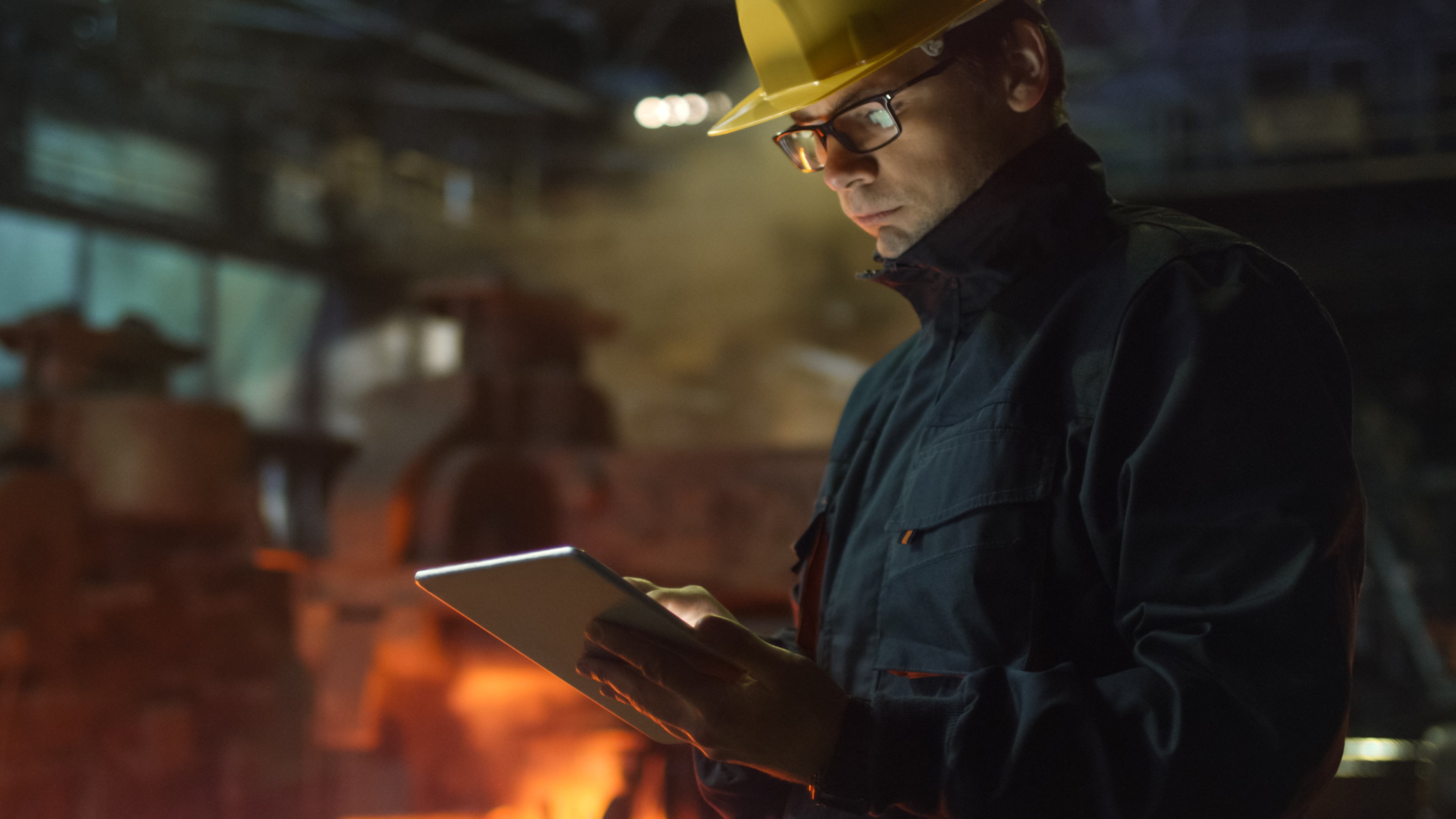What is the role of a metallurgical engineer?
Metallurgical engineers operate at the crossroads of materials science and engineering, focusing specifically on the study and application of metals and their properties. They are responsible for designing, testing, and improving metal-based materials and processes used in various industries. Metallurgical engineers ensure the quality, durability, and performance of metal components and structures while adhering to industry standards and safety regulations.
Ready to take the next step?
Metallurgical Engineer Careers at Brunel
Industrial Engineer (w/m/d)
Location: Stuttgart
Branche: Machine & Plant Design
Expertise: Production & Manufacturing
Experience: 2 years
Entwicklung und Planung des Layouts für einen neuen Standort zur Montage unter Berücksichtigung von Produktionsanforderungen, Logistik und zukünftiger Skalierbarkeit Optimierung der Produktionsfläche hinsichtlich Effizienz, ergonomischem Arbeitsfluss, Materialtransportwegen und Einhaltung von Sicherheits- und Arbeitsschutzvorschriften Koordination und enge Zusammenarbeit mit interdisziplinären Teams, einschließlich Produktion, Logistik, Qualitätssicherung und Engineering, zur Sicherstellung technischer Anforderungen und Produktionsziele Durchführung von Prozessanalysen bestehender Abläufe zur Identifikation von Verbesserungspotenzialen und Ableitung geeigneter Maßnahmen zur Effizienzsteigerung Entwicklung von Layout- und Flächenkonzepten mithilfe gängiger Planungstools und Präsentation der Ergebnisse gegenüber internen Stakeholdern Begleitung der Umsetzung vor Ort sowie Überwachung der Einhaltung von Zeitplänen und Budget
SCADA Engineer (m/w/d)
Location: Bielefeld
Branche: Machine & Plant Design
Expertise: Planning & Testing
Experience: 3 years
Konzeption, Entwicklung und Implementierung von SCADA-Systemen Visualisierung von Prozess- und Produktionsdaten Anbindung von SPS- und Leitsystemen Datenanalyse und Optimierung von Anlagenprozessen Unterstützung bei Inbetriebnahmen und Systemtests Pflege und Weiterentwicklung bestehender SCADA-Lösungen
Hardware Engineer Energieversorgung (w/m/d)
Location: Wien
Branche: Renewable Energy
Expertise: Research & Development
Experience: 2 years
Als Hardware Engineer (w/m/d) verantworten Sie die Projektierung der elektrotechnischen Ausrüstung von Energieversorgungsprojekten unter Einhaltung aller technischen Anforderungen, Normen und Kundenvorschriften. Selbstständig erstellen Sie Stromlaufpläne, Aufbaupläne und Verkabelungslisten. Sie unterstützen bei der elektrotechnischen Kalkulation und dem Angebotswesen. Die Organisation des Schaltschrankbaus sowie die Abstimmung der elektrotechnischen Arbeiten mit den anderen Gewerken ist ebenso Teil Ihres Verantwortungsbereichs.
Manufacturing Engineer - Medizintechnik (w/m/d)
Branche: Medical devices
Expertise: Production & Manufacturing
Experience: 2 years
Sie definieren und beschreiben Fertigungsprozesse und erstellen die technische Dokumentation unter Berücksichtigung der Arbeitssicherheit, der Produktionsmethoden und der Qualitätsanforderungen. Sie führen neue Produkte ein, indem Sie Prozesslayouts definieren, Werkzeuge entwickeln und neue Fertigungsanlagen implementieren. Sie überwachen die erfolgreiche Überführung von Produkten in die Serienfertigung und stellen die Produktqualität sicher. In Zusammenarbeit mit den relevanten Abteilungen identifizieren und lösen Sie Produktions- und Qualitätsprobleme. Sie gewährleisten die Einhaltung regulatorischer Anforderungen durch Validierung und Verifizierung. Zudem erstellen Sie technische Dokumentationen, einschließlich Testspezifikationen, Montageanleitungen und Prozessvalidierungen. Sie leiten und wirken an Lean- sowie Produktivitätsprojekten zur kontinuierlichen Verbesserung mit. Darüber hinaus unterstützen und implementieren Sie Automatisierungs- und Digitalisierungsprojekte.
System Engineer ADAS (w/m/d)
Location: Braunschweig
Branche: Automotive
Expertise: Research & Development
Experience: 1 years
Überwachung der Systementwicklungsprozesse, um sicherzustellen, dass alle definierten Anforderungen und Normen (z.B. ISO 9001, IATF 16949) eingehalten werden. Erstellen detaillierter Spezifikationen und technischer Dokumentationen, um eine klare Kommunikation mit allen Projektbeteiligten zu gewährleisten. Durchführung von Risikoanalysen und Bewertung von Sicherheitsaspekten gemäß ISO 26262 und anderen relevanten Standards. Sicherstellung einer erfolgreichen Integration der Systemkomponenten und Unterstützung bei der Validierung und Verifikation der Systeme im Entwicklungsprozess. Enge Zusammenarbeit mit verschiedenen Fachabteilungen wie Software-, Hardware- und Testteams, um eine effiziente Systementwicklung zu gewährleisten. Planung und Durchführung von Systemtests, um die Funktionalität und Sicherheit des Systems zu überprüfen und sicherzustellen, dass es den Anforderungen entspricht. Verantwortlich für das Management von Systementwicklungsprojekten, inklusive Zeitplanung, Ressourcenmanagement und Budgetüberwachung. Identifikation und Implementierung von Verbesserungsmaßnahmen im Systementwicklungsprozess, basierend auf Best Practices und Lessons Learned. Unterstützung bei der Auswahl von Lieferanten und Dienstleistern für Systemkomponenten und Verantwortung für die Qualität und Pünktlichkeit der Lieferungen. Verantwortung für die Abnahme von Systemen und Komponenten in Zusammenarbeit mit den relevanten Stakeholdern und die Dokumentation der Abnahmetests.
Dev.Ops. Engineer (m/w/d)
Location: Bielefeld
Branche: Machine & Plant Design
Expertise: Planning & Testing
Experience: 2 years
Die Sicherstellung des Betriebs der Cloud-Infrastruktur basierend auf Linux liegt in Ihrem Verantwortungsbereich Darüber hinaus integrieren Sie neue Software- und Systemkomponenten Betrieb und Überwachung der Backups und Metriken zählt zu Ihren Aufgaben Sie sind Teil eines agilen Teams für das Konfigurations- und Releasemanagement (Roll-out-Planung) Außerdem tragen Sie zur Verbesserung der Tool-Landschaft bei
Robotics Engineer - KUKA / ABB / Fanuc (w/m/d)
Location: Bielefeld
Branche: Machine & Plant Design
Expertise: Planning & Testing
Experience: 2 years
Programmierung, Inbetriebnahme und Optimierung von Industrierobotern (KUKA, ABB, Fanuc) Erstellung und Anpassung von Roboterprogrammen für Produktions- und Montageanlagen Integration von Robotersystemen in bestehende Automatisierungslösungen Durchführung von Tests, Optimierungen und Abnahmen Fehleranalyse und Störungsbehebung Zusammenarbeit mit SPS-Programmierern, Konstruktion und Projektleitung
Lead Engineer Automatisierung (w/m/d)
Location: Salzburg
Branche: Life Sciences
Expertise: Production & Manufacturing
Experience: 5 years
Sie tragen die Projektverantwortung für komplexe Automatisierungsprojekte von der Idee bis zur Inbetriebnahme, inklusive Zeit-, Budget- und Qualitätskontrolle. Sie entwickeln technische Konzepte für anspruchsvolle Projektanforderungen und überführen diese in Angebote und Kalkulationen. Sie setzen innovative Automatisierungslösungen im GMP-regulierten Umfeld und in der Halbleiterindustrie um, inklusive Computer System Validation. Sie unterstützen Kunden in frühen Projektphasen, wie Konzeptentwicklung und Vorplanung, und beraten fachlich. Sie coachen Senior und Lead Engineers und fördern eine offene, projektorientierte Teamkultur. Sie gestalten Standards, Templates und Best Practices im Bereich Automation mit und entwickeln diese kontinuierlich weiter. Sie führen virtuelle Inbetriebnahmen und Softwaretests durch und berücksichtigen funktionale Sicherheit, Risikoanalysen, ATEX, WHG und Elektrotechnik-Grundlagen. Sie wirken bei Vertragsgestaltung und Management von Nachunternehmern mit und übernehmen eine Expertenrolle bei technischen Herausforderungen und Verhandlungen.
Manufacturing Engineer (w/m/d)
Location: Frankfurt am Main
Branche: Machine & Plant Design
Expertise: Production & Manufacturing
Experience: 2 years
Die Planung, Analyse und kontinuierliche Optimierung von Produktionsprozessen zur Steigerung von Effizienz, Qualität und Wirtschaftlichkeit gehören zu Ihren Aufgaben. Dabei implementieren und betreuen Sie Lean-Management-Methoden wie Kanban, 5S und Wertstromanalysen und tragen so nachhaltig zur Reduzierung von Verschwendung und zur Stabilisierung von Produktionsabläufen bei. Zudem analysieren Sie relevante Kennzahlen, leiten gezielte Verbesserungsmaßnahmen ab und arbeiten eng mit internen Schnittstellen sowie externen Zulieferern an der Entwicklung und Einführung neuer Anlagen- und Produktionslösungen. Darüber hinaus fungieren Sie als zentrale Schnittstelle zwischen Entwicklung und Fertigung und stellen die erfolgreiche Überführung von Design-, Prozess- und Qualitätsanforderungen in die Serienproduktion sicher.
Software Engineer - Automatisierung (m/w/d)
Location: Braunschweig
Branche: Conventional Energy
Expertise: IT & Shared Services
Experience: 2 years
Eigenständige Wartung und Erweiterung von Software für Mikrocontroller, Test-Frameworks, Linux-Module und Skripte ist ein zentraler Aspekt Ihrer Verantwortung. Sie unterstützen bei der Installation und Nutzung der Software im Produktionsbereich, um einen reibungslosen Ablauf sicherzustellen. Analyse und Behebung von Fehlern sind wichtige Aufgaben, um die Effizienz und Funktionalität der Software sicherzustellen. Inbetriebnahme von Leiterplatten und Umgang mit Testaufbauten gehören ebenfalls zu Ihren Tätigkeiten. Sie arbeiten aktiv in einem interdisziplinären Team mit Entwicklern aus den Bereichen Maschinenbau, Software und Elektrotechnik zusammen. Darüber hinaus teilen Sie Ihr Anwendungswissen über das Team hinaus, um das Wissen im gesamten Unternehmen zu verbreiten.
What do metallurgical engineers do?
Metallurgical engineers have diverse and important responsibilities. They analyze and evaluate the properties of metals to develop new materials or improve existing ones, ensuring they meet the required specifications and performance standards. These professionals collaborate with other engineers, researchers, and manufacturers to identify specific material needs and design innovative solutions to address them effectively.
Metallurgical engineers are heavily involved in testing and validating metal materials, conducting experiments to determine their mechanical, thermal, and chemical properties. They troubleshoot and rectify any issues or weaknesses found during testing, making necessary adjustments to enhance the overall performance and reliability of metal components.
What are the required skills for a metallurgical engineer?
To excel in the role of a metallurgical engineer, individuals must possess a versatile skill set. Strong problem-solving abilities are essential for addressing complex material challenges and optimizing manufacturing processes. Effective communication skills are necessary for collaborating with interdisciplinary teams, including fellow engineers, researchers, and technicians.
Moreover, metallurgical engineers should have an in-depth understanding of metallurgical regulations and compliance procedures to ensure that the materials they develop meet all safety and quality requirements. Analytical skills are vital for conducting thorough analyses and assessments of metal properties, guiding decision-making and material selection.
Where do metallurgical engineers work?
Metallurgical engineers find employment opportunities in a range of industries that utilize metal materials. These may include manufacturing companies, aerospace and automotive industries, construction and infrastructure development, mining and extraction companies, and research institutions dedicated to materials science and engineering.
Common metallurgical engineer responsibilities
Design, develop, and test metal materials and processes, ensuring they meet safety standards and industry guidelines;
Collaborate with engineers and industry stakeholders to understand material needs and incorporate them into the design and production process;
Conduct extensive testing and validation of metal materials, making improvements to enhance their performance and durability;
Stay updated with industry advancements and regulations, integrating the latest practices;
Troubleshoot and resolve technical issues to maintain the reliability and functionality of metal components;
Ensure compliance with relevant safety regulations and industry standards throughout the project lifecycle;
Communicate effectively with interdisciplinary teams to foster collaboration and achieve project objectives;
Analyze and assess potential risks associated with metal materials, implementing preventive measures to ensure their suitability for various applications;
Participate in continuous improvement initiatives to optimize the performance of metal materials and manufacturing processes;
Keep detailed records of material development, testing, and validation processes, adhering to documentation standards;
Support the implementation of new metal materials in various industries through training and education.
Qualifications for metallurgical engineers
To become a metallurgical engineer, candidates should possess at least a Bachelor's degree in metallurgical engineering or a related field. Additional certifications in materials science, metallurgy, or quality management can be advantageous.
Other essential qualifications include:
- 2-4+ years of experience in metallurgical engineering or materials-related projects;
- Strong knowledge of metallurgical regulations and safety standards;
- Proficiency in conducting testing and validation procedures for metal materials;
- Excellent problem-solving and analytical skills;
- Effective verbal and written communication abilities;
- Familiarity with metallurgical terminology and materials processing techniques;
- Ability to work collaboratively in interdisciplinary teams;
- Commitment to ensuring material quality and enhancing performance through innovative engineering solutions.




